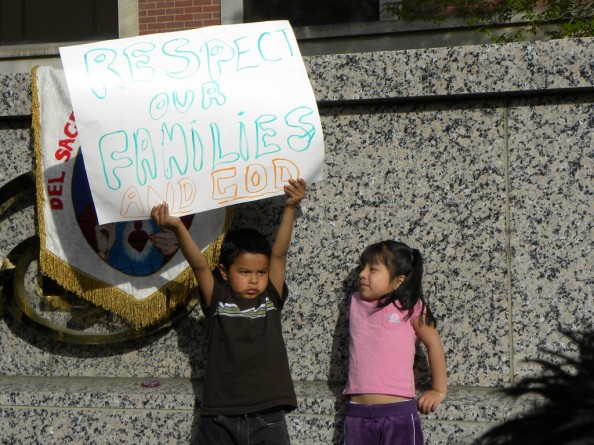By Ellen Bravo
I’m reading Junot Diaz’s new book and my head is swimming with images of Ana Iris, a Dominican mother of three who hasn’t seen her children in seven years. In order to feed them, she’s come to New York and works two jobs, one laundering bloody hospital sheets and the other filleting fish. Even though the apartment she shares with several others is freezing in the winter, she sleeps with mosquito netting over her bed, which she folds neatly every morning.
How does she survive? “You must not think on these things,” she tells her best friend. “Keep them out of your mind. You do not want to go crazy from them.”
Those of us who value families, however, must think on these things. We must picture all the women like Ana Iris, many of whom left their own children to take care of ours.
We must also picture the women torn from their families on the reverse route, the mother deported to her country of origin while children born here in the States come home to find that what they have dreaded every day has actually happened.
We must hear the voices of children, like Heidi Ruby Portugal and Matteo Perea, who made the trip to the halls of Congress two years ago to share their experiences with members of Congress. I was one of a group of women who had traveled to Phoenix on Mother’s Day that year to meet with mothers and children, and I was in the hearing room when they testified.
“Before [my mother’s detention],” said Heidi, then 11 years old, “I would admire all uniformed people that protect our country. …They took away the most precious thing that children have, our mother. With one hit they took away my smile and my happiness.”
“I had to teach [my baby brother] to drink the canned milk because he was used to my mom breast‐feeding him,” she said. The family was allowed to bring the baby to see his mother in detention, but she was not allowed to touch him, much less feed him.
“For my little brother Miguel, I was getting him ready to enter kindergarten …making sure he was eating because he was losing his appetite,” Heidi told the committee. “He got really sick from asthma and had to be put on his inhaler every three to four hours. My sister Maria, her grades were dropping really fast…. I had to take her to school really early, around 5:45am on the bike. At that time it was really cold.”
Matteo, age 12, described his anxiety every day that “this would be the day when no one would come to pick me up.” All his friends share this fear, he said.
Those of us who care about women and families must breathe in the reality of domestic workers who aren’t allowed even five hours of uninterrupted sleep, as documented in a recent report by the National Domestic Workers Association. We must share their stories of caregivers having to work sick or being unable to earn enough to take care of their own families.
And then we must act.
We can organize support for basic demands: to include domestic and home care workers in labor law. To create a pathway to citizenship for immigrant workers. And to enact public policies that raise the standards of all low-wage workers – policies like fixing the minimum wage, paid sick days and affordable family leave, access to affordable medical care, and opportunities for job training and career ladders.
And we can support groups like the National Domestic Workers Association and others working for solutions like these. As Ai-jen Poo writes in the New York Times, “We are fundamentally a multiracial society. No one responsible for caring for the most precious elements of our lives — our homes and our families — should be at risk of being torn apart as a result of our immigration policies.”
This is the only way to warm up the room for Ana Iris, and to remove Mateo’s fears.
